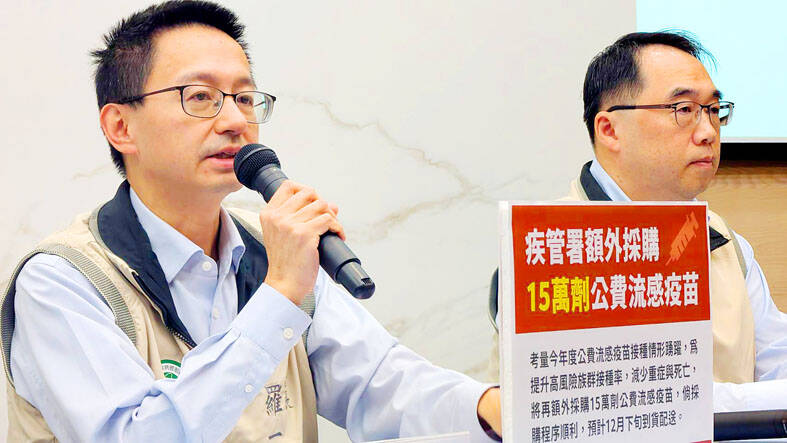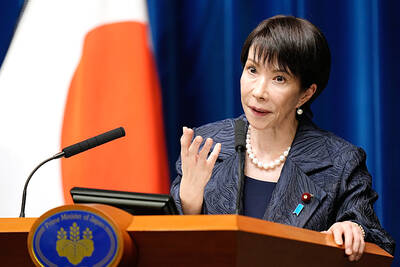The government has purchased 150,000 additional doses of free flu vaccines, as more than 90 percent of the supply has been used up, the Centers for Disease Control (CDC) said yesterday.
Supply of the remaining government-funded vaccines is expected to run out by the end of the year, but the new ones would be available starting next month, the CDC said.
There were 85,425 hospital visits for flu-like illnesses last week, covering the period from Nov. 16 to Saturday, which is 10.1 percent lower than the previous week, CDC Deputy Director-General Tseng Shu-hui (曾淑慧) said.

Photo: CNA
“However, 25 severe flu cases and 12 flu-related deaths were confirmed last week,” Tseng said, advising the public to remain vigilant as flu cases in neighboring countries, including Japan, South Korea and China, have seen a rapid rise, and are also climbing in Europe, the US and Canada.
The youngest severe case last week was a man in his 20s in central Taiwan, who has a history of hypertension, heart failure and kidney failure, and is on dialysis treatment, CDC physician Huang Po-han (黃柏翰) said, adding that the man had not been vaccinated against the flu.
His symptoms began with coughing and a runny nose, but worsened to include shortness of breath, difficulty breathing and fatigue. He sought treatment at an emergency room, where he was diagnosed with pulmonary infiltrates in both lungs, and tested positive for influenza A infection, Huang said.
After being hospitalized in an intensive care unit for four days, the man has been moved to a normal ward and is in stable condition, he said, urging people at a higher risk of severe complications from infection to get vaccinated.
CDC Director-General Philip Lo (羅一鈞) said that 6.68 million doses of government-funded flu vaccines were purchased for this flu season, and more than 6.12 million doses, or 91.7 percent, have been administered, while the remainder is expected to run out before the end of the year.
The vaccine coverage rate among elderly people is only 47.6 percent, still lower than the CDC’s goal of at least 55 percent, he said.
To protect more people against another wave of flu infections estimated between January and February, the CDC has purchased 150,000 extra doses, he said.
The vaccines are expected to arrive and be distributed to local health departments around the middle of next month, he said.
“People who are still thinking about it should get vaccinated as soon as possible, as it is likely the last batch of vaccines purchased this season, while self-paid vaccines are also likely to run out soon,” Lo said.
Adding in the newly purchased doses, total vaccine purchases this season would be 6.829 million doses, marking a record high, he said.
Meanwhile, as families have become more diversified, the CDC has modified the eligibility requirements for government-funded flu and COVID-19 vaccines, Lo said.
The modification is a change in the wording “fathers and mothers of newborns under six months old” to “parents of newborns under six months old,” and that the definition of “parents” has been expanded to include various conditions, such as documents to prove “living together” before adoption has been finalized, he said.
In other news, the CDC said there were 11,893 hospital visits for enterovirus infection last week, which is above the epidemic threshold.
As weekly cases have been rising, parents of newborns and young children should pay close attention to signs of severe illness if their child is infected, it said.

The Ministry of Foreign Affairs (MOFA) yesterday voiced dissatisfaction with the Comprehensive and Progressive Agreement for Trans- Pacific Partnership (CPTPP), whose latest meeting, concluded earlier the same day, appeared not to address the country’s application. In a statement, MOFA said the CPTPP commission had "once again failed to fairly process Taiwan’s application," attributing the inaction to the bloc’s "succumbing to political pressure," without elaborating. Taiwan submitted its CPTPP application under the name "Separate Customs Territory of Taiwan, Penghu, Kinmen and Matsu" on Sept. 22, 2021 -- less than a week after China

THE GOOD WORD: More than 100 colleges on both sides of the Pacific will work together to bring students to Taiwan so they can learn Mandarin where it is spoken A total of 102 universities from Taiwan and the US are collaborating in a push to promote Taiwan as the first-choice place to learn Mandarin, with seven Mandarin learning centers stood up in the US to train and support teachers, the Foundation for International Cooperation in Higher Education of Taiwan (FICHET) said. At the annual convention of the American Council on the Teaching of Foreign Languages held over the weekend in New Orleans, Louisiana, a Taiwan Pavilion was jointly run by 17 representative teams from the FICHET, the Overseas Community Affairs Council, the Steering Committee for the Test of Proficiency-Huayu, the

A home-style restaurant opened by a Taiwanese woman in Quezon City in Metro Manila has been featured in the first-ever Michelin Guide honoring exceptional restaurants in the Philippines. The restaurant, Fong Wei Wu (豐味屋), was one of 74 eateries to receive a “Michelin Selected” honor in the guide, while one restaurant received two Michelin stars, eight received one star and 25 were awarded a “Bib Gourmand.” The guide, which was limited to restaurants in Metro Manila and Cebu, was published on Oct. 30. In an interview, Feng Wei Wu’s owner and chef, Linda, said that as a restaurateur in her 60s, receiving an

MORE RETALIATION: China would adopt a long-term pressure strategy to prevent other countries or future prime ministers following in Sanae Takaichi’s steps, an academic said Taiwan should maintain communications with Japan, as Japanese Prime Minister Sanae Takaichi is to lead a revision of security documents, Taiwanese academics said yesterday. Tensions have risen between Japan and China over remarks by Takaichi earlier this month that the use of force against Taiwan would constitute a “survival-threatening situation” for Japan. Prospect Foundation president Lai I-chung (賴怡忠) yesterday said Takaichi’s stance regarding Taiwan is the same as past Japanese prime ministers, but her position is clearer than that of her predecessors Fumio Kishida and Shigeru Ishiba. Although Japan views a “Taiwan contingency” as a “survival-threatening situation,” which would allow its military to